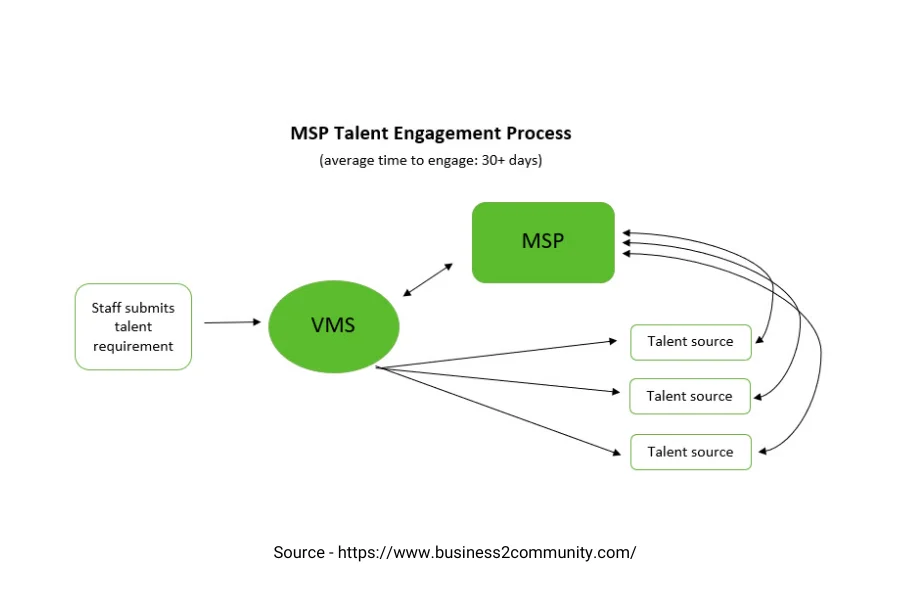What is MSP in Staffing? A managed services provider (MSP) plays a crucial role in staffing agencies, acting as an intermediary between staffing firms and clients seeking temporary employees. Understanding the functions and benefits of an MSP is imperative for staffing agencies exploring ways to expand their operations.
This blog post research’s into the intricacies of what an MSP is, how it operates, its role in the staffing process, and the advantages of integrating it with vendor management systems.
By shedding light on the significance of MSPs in the staffing industry, we aim to provide valuable insights for staffing agencies looking to enhance their recruitment processes and overall efficiency. Let’s explore the world of MSPs in staffing together.
Table of Contents
Understanding MSPs and How They Function
In the staffing industry, MSP stands for Managed Service Provider. It refers to a third-party company that specializes in managing your temporary worker recruitment process. They essentially act as an outsourced partner for all your contingent workforce needs.
Here’s a breakdown of what an MSP in staffing does:
- Recruitment and Sourcing: They handle the entire process of finding qualified candidates for your temporary positions, from advertising the jobs to screening resumes and conducting interviews.
- Vendor Management: If you use multiple staffing agencies, an MSP can manage those relationships, ensuring you get the best rates and services.
- Compliance: They stay up-to-date on employment regulations and ensure your temporary hiring practices are compliant.
- Cost Savings: By streamlining the recruitment process and potentially negotiating better rates with vendors, MSPs can help you save money on your contingent workforce.
- Data and Analytics: They provide insights into your hiring trends and performance metrics, allowing you to make data-driven decisions about your workforce.
MSP acts as an extension of your HR team, specifically focused on managing your temporary staffing needs.
Role of MSPs in Talent Acquisition
MSPs play a crucial role in talent acquisition by serving as an intermediary between staffing agencies and clients. They manage the entire recruitment process, from raising awareness of temporary positions to selecting and onboarding external workforce. MSPs help in receiving job offers, compiling work requirements, and tracking workforce performance for staffing agencies.
The Intermediary: MSPs’ Position Between Staffing Agencies and Clients
Any staffing agency looking to expand and streamline their operations can benefit from the services offered by MSPs. Acting as a bridge, MSPs connect staffing firms with clients, simplifying the process of finding qualified candidates, managing job requirements, and ensuring compliance with client needs. MSPs use their industry expertise to facilitate smooth communication and successful placements between agencies and clients.
Talent acquisition in today’s market requires a delicate balance of understanding both the employer’s needs and the skills of potential candidates. MSPs excel at this by leveraging their knowledge and networks to match the right talent with the right job. By establishing themselves as the intermediary between staffing agencies and clients, MSPs ensure a seamless flow of talent and a successful recruitment process for all parties involved.

MSP vs. VMS: Clarifying the Distinctions
What Differentiates MSP from VMS?
Some confusion may arise when distinguishing between Managed Services Providers (MSP) and Vendor Management Systems (VMS). An MSP acts as a human-driven intermediary that manages the entire talent acquisition and recruitment process, serving as a bridge between staffing agencies and clients. On the other hand, a VMS is a technology solution that automates staffing processes and enhances efficiency without the human element typically found in an MSP.
The Integration of MSP and VMS for Enhanced Efficiency
Efficiency is paramount in the staffing industry, and the combination of MSP and VMS can lead to significant enhancements in operational effectiveness. By integrating the expert insight and human intervention offered by an MSP with the automation and data management capabilities of a VMS, staffing agencies can streamline their recruitment processes, find quality candidates at affordable costs, and gain valuable insights to improve overall performance.
Related: Recruiting vs. Sourcing
Advantages of Utilizing MSPs for Staffing Agencies
Operational Benefits and Business Growth
With the utilization of Managed Services Providers (MSPs) in staffing agencies, operational efficiency and business growth become achievable goals. MSPs serve as intermediaries between agencies and clients, handling key staffing activities such as receiving job offers, compiling work requirements, onboarding external workforce, and tracking performance.
It allows staffing agencies to focus on core functions while expanding their reach and securing new clients through the expertise and connections provided by MSPs.
MSPs’ Expertise and Resource Allocation to Improve Staffing Practices
MSPs bring in knowledge, expertise, manpower, and resources that enable staffing agencies to operate more effectively and efficiently. By combining Vendor Management Systems with an MSP’s experience, staffing agencies gain access to talented candidates at affordable costs, ensuring compliance, and improving overall performance. MSPs also play a crucial role in providing valuable insights derived from data analytics to enhance staffing practices and drive growth.
Another benefit of leveraging MSPs is the ability to prevent legal issues by enforcing compliance with temporary staff and clients. By outsourcing certain recruitment and management tasks to an MSP, staffing agencies can streamline their operations and stay competitive in the industry, ultimately leading to improved service delivery and client satisfaction.

The Pros and Cons for Companies Partnering with an MSP
Pros of Delegating to an MSP
Delegating to a Managed Services Provider (MSP) can bring numerous benefits to a staffing agency. MSPs can offer expertise in recruiting temporary employees, manage the talent acquisition process, and improve efficiency in finding and matching candidates. They can also provide insights on business operations and expand your agency’s reach with clients and candidates.
Cons and Considerations of MSP Engagement
An MSP can bring immense value to a staffing agency, but there are also considerations to keep in mind. Companies partnering with an MSP may lose some control over staffing and outreach efforts. While an MSP can provide expertise, there may be costs involved, and decisions may not always align with the agency’s preferences. It’s crucial for companies to assess the level of control they are willing to relinquish and the potential impact on operations.
Companies considering an MSP partnership should carefully evaluate the cost-benefit analysis, the level of oversight they are comfortable with, and the potential impact on their staffing agency’s operations. Despite the benefits of leveraging an MSP’s expertise and resources, it is important to weigh the pros and cons before making a decision.
To Wrap Up: What is MSP in Staffing?
Upon reflecting on the role and benefits of Managed Services Providers (MSPs) in the staffing industry, it is evident that MSPs offer a valuable bridge between staffing agencies and clients. By providing expertise, access to a wider pool of talent, and efficient management of contingent workforce processes, MSPs can significantly enhance the operations and growth potential of staffing agencies.
While there are pros and cons to consider when deciding whether to work with an MSP, the potential advantages in terms of efficiency, expertise, and client connections make them a compelling option for many staffing agencies looking to expand and improve their services.




